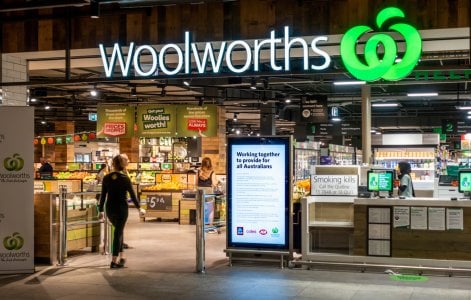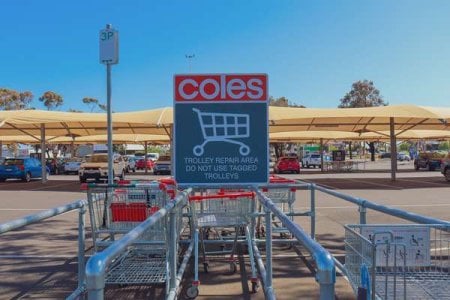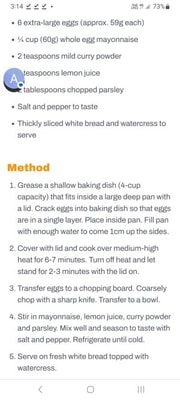Are supermarkets secretly watching you? The shocking reason behind their increased surveillance
Over the last couple of years, supermarkets have increased surveillance measures to secure their store shelves and discourage pesky thieves. While these measures might seem intrusive to many, they result from a rather unfortunate increase in theft incidents across the nation.
Remember when Coles used to put out bold signage warning customers that shoplifting was a crime? Well, they soon realised that treating shoppers as potential thieves wasn’t the ‘best’ approach, so they started revamping the stores and even sold beautiful flowers at the entrances to enhance the aesthetic appeal of their stores, so they looked more welcoming.
But fast-forward to the present day, a different bloom has sprouted: retail theft. Major supermarkets have reported a startling 20 per cent increase in stock loss annually–comprising both theft and food wastage.
As per information given by the Australian Retailers Association (ARA), theft alone accounts for 2 per cent to 3 per cent of the total retail sales, and according to the supermarkets, that’s big enough to poke a hole in supermarket profits, causing them to act.
The retailers have varied responses, including heightened surveillance, biometric tracking, and self-checkout cameras. Of course, these measures have not gone unnoticed by the everyday shopper, sparking criticism and raising the question: Are supermarkets secretly watching you?
Dr Paula Dootson, an Associate Professor at Queensland University of Technology, is concerned about the emotional impact of these surveillance technologies on customers.
'Until we can come together to give that social license to operate… and they get some kind of informed consent, I don’t know how effective these measures are going to be in having longevity', she said.
One of the leading supermarket giants, Woolworths, adopted Auror’s retail crime intelligence platform in 2020 to identify known shoplifters or aggressive patrons. The system is employed across all Woolworths supermarkets, Metro, and BIG W stores.
But even with such security measures in place, Woolworths CEO Brad Banducci stated that these measures are there to protect staff almost as much as it is about protecting merchandise.
‘It is partly about theft, but it is partly about aggression towards our team… we see that as more important than the theft issue,’ Mr Banducci claimed. ‘We have seen a rise in aggression.’
One popular measure amongst others is the $50 million 'assisted scan' technology at self-checkouts. A feature of this is the red marker assigned to you that'll turn green once you've paid, allowing the gates to open automatically as you approach.
Last week, we reported an incident where a 68-year-old Woolies shopper was accused of theft by this technology. The cameras at the checkout flagged that the customer had not scanned a bottle of juice.
The shopper expressed frustration at the incident: 'To put it bluntly, I was p***ed off, I just couldn't believe it.'
You can read more about that story here.
Now, Coles, not wanting to be left behind, has trialled trolley locking systems, standard security gates and CCTV in stores.
A spokesperson shared, ‘Trolley lock technology has been in place at a number of our stores in recent years, and this technology uses sensors to prevent trolleys leaving the store if someone hasn't first paid at a register.’
‘Like most businesses and public spaces, we use surveillance technologies in accordance with stringent privacy laws, and we have strict protocols in place around access to the footage,’ they added.
However, Samantha Floreani from Digital Rights Watch raises valid concerns about the environment of heightened data collection and surveillance in supermarkets, making them uncomfortable for some patrons.
‘Even if customers are aware and may be uncomfortable with it, many people have no choice but to continue to shop at the major supermarkets because of a lack of competition,’ she stated.
Ms. Floreani believed customers should be able to shop without being tracked and monitored.
‘It’s telling that major supermarkets are prioritising investment in privacy-invasive surveillance technology in the middle of a cost-of-living crisis rather than considering other ways that might lower rates of theft, such as reining in their huge profit margins and lowering prices. It’s really cynical, and it’s really punitive,’ she said.
While the reasons behind the uptick in theft are multifaceted, one reason that surfaces frequently is connected to a surge in grocery prices, creating a strain on households. You must have noticed, right? And it's no secret that high prices have turned common grocery items like baby formula and meat into attractive targets for organised crime.
But apart from the tech side of things, the human aspect of this problem shouldn't be ignored. The majority of people do feel a level of immunity toward large supermarket chains, particularly after their remarkable pandemic profit surge.
‘These retailers are just not seen as victims, either by organised crime or by everyday people who are impacted by cost of living pressures,’ Dr Dootson claimed.
She added: ‘My research on understanding deviant consumer behaviour suggests if you don’t perceive the retailer to be a victim, then you can justify your behaviour.’
The Australian Retailers Association's chief executive, Paul Zahra, adopts a pragmatic stance towards these new security adaptations.
‘It’s employed to not only protect inventory but also people, which is why I’ve been a strong advocate,’ Zahra declared. ‘The need to invest in security is becoming first and foremost.’
So, the next time you’re deciding between apples and oranges, remember: you might not be the only one watching.

What do you think of this story, members? Share your thoughts in the comments below!
Remember when Coles used to put out bold signage warning customers that shoplifting was a crime? Well, they soon realised that treating shoppers as potential thieves wasn’t the ‘best’ approach, so they started revamping the stores and even sold beautiful flowers at the entrances to enhance the aesthetic appeal of their stores, so they looked more welcoming.
But fast-forward to the present day, a different bloom has sprouted: retail theft. Major supermarkets have reported a startling 20 per cent increase in stock loss annually–comprising both theft and food wastage.
As per information given by the Australian Retailers Association (ARA), theft alone accounts for 2 per cent to 3 per cent of the total retail sales, and according to the supermarkets, that’s big enough to poke a hole in supermarket profits, causing them to act.
The retailers have varied responses, including heightened surveillance, biometric tracking, and self-checkout cameras. Of course, these measures have not gone unnoticed by the everyday shopper, sparking criticism and raising the question: Are supermarkets secretly watching you?
Dr Paula Dootson, an Associate Professor at Queensland University of Technology, is concerned about the emotional impact of these surveillance technologies on customers.
'Until we can come together to give that social license to operate… and they get some kind of informed consent, I don’t know how effective these measures are going to be in having longevity', she said.
One of the leading supermarket giants, Woolworths, adopted Auror’s retail crime intelligence platform in 2020 to identify known shoplifters or aggressive patrons. The system is employed across all Woolworths supermarkets, Metro, and BIG W stores.
But even with such security measures in place, Woolworths CEO Brad Banducci stated that these measures are there to protect staff almost as much as it is about protecting merchandise.
‘It is partly about theft, but it is partly about aggression towards our team… we see that as more important than the theft issue,’ Mr Banducci claimed. ‘We have seen a rise in aggression.’
One popular measure amongst others is the $50 million 'assisted scan' technology at self-checkouts. A feature of this is the red marker assigned to you that'll turn green once you've paid, allowing the gates to open automatically as you approach.
Last week, we reported an incident where a 68-year-old Woolies shopper was accused of theft by this technology. The cameras at the checkout flagged that the customer had not scanned a bottle of juice.
The shopper expressed frustration at the incident: 'To put it bluntly, I was p***ed off, I just couldn't believe it.'
You can read more about that story here.
Now, Coles, not wanting to be left behind, has trialled trolley locking systems, standard security gates and CCTV in stores.
A spokesperson shared, ‘Trolley lock technology has been in place at a number of our stores in recent years, and this technology uses sensors to prevent trolleys leaving the store if someone hasn't first paid at a register.’
‘Like most businesses and public spaces, we use surveillance technologies in accordance with stringent privacy laws, and we have strict protocols in place around access to the footage,’ they added.
However, Samantha Floreani from Digital Rights Watch raises valid concerns about the environment of heightened data collection and surveillance in supermarkets, making them uncomfortable for some patrons.
‘Even if customers are aware and may be uncomfortable with it, many people have no choice but to continue to shop at the major supermarkets because of a lack of competition,’ she stated.
Ms. Floreani believed customers should be able to shop without being tracked and monitored.
‘It’s telling that major supermarkets are prioritising investment in privacy-invasive surveillance technology in the middle of a cost-of-living crisis rather than considering other ways that might lower rates of theft, such as reining in their huge profit margins and lowering prices. It’s really cynical, and it’s really punitive,’ she said.
While the reasons behind the uptick in theft are multifaceted, one reason that surfaces frequently is connected to a surge in grocery prices, creating a strain on households. You must have noticed, right? And it's no secret that high prices have turned common grocery items like baby formula and meat into attractive targets for organised crime.
But apart from the tech side of things, the human aspect of this problem shouldn't be ignored. The majority of people do feel a level of immunity toward large supermarket chains, particularly after their remarkable pandemic profit surge.
‘These retailers are just not seen as victims, either by organised crime or by everyday people who are impacted by cost of living pressures,’ Dr Dootson claimed.
She added: ‘My research on understanding deviant consumer behaviour suggests if you don’t perceive the retailer to be a victim, then you can justify your behaviour.’
The Australian Retailers Association's chief executive, Paul Zahra, adopts a pragmatic stance towards these new security adaptations.
‘It’s employed to not only protect inventory but also people, which is why I’ve been a strong advocate,’ Zahra declared. ‘The need to invest in security is becoming first and foremost.’
So, the next time you’re deciding between apples and oranges, remember: you might not be the only one watching.
Key Takeaways
- Australian supermarkets are experiencing a surge in retail theft, with increased stealing from cash-strapped shoppers and organised crime.
- In response to the rise in theft, supermarkets have invested in covert security, self-checkout cameras, and biometric trackers, triggering privacy concerns.
- Woolworths has used the Auror retail crime intelligence platform since 2020 to help identify known shoplifters; the system also helps to protect staff against aggressive customers.
- Coles has trialled trolley locking systems, standard security gates and CCTV, and many measures are put in place under stringent privacy laws.
What do you think of this story, members? Share your thoughts in the comments below!










